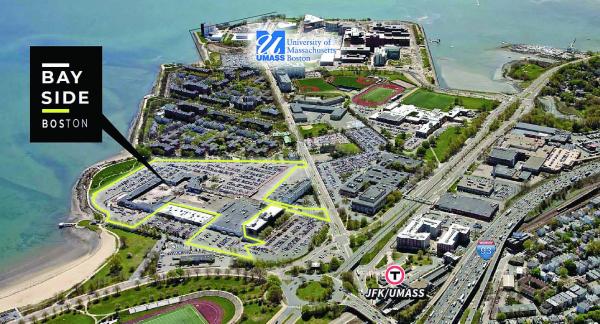August 29, 2019

An illustration from UMass produced marketing materials shows the Bayside property that is now under lease to Accordia Partners.
The University of Massachusetts Boston is structuring its lease agreement with the developer of its prime Bayside waterfront property in Dorchester’s Columbia Point neighborhood very differently than it did a few years ago in its ill-fated effort to lease the site to New England Patriots owner Bob Kraft.
Accordia Partners will be paying UMass anywhere from $192.5 million to $235 million up front in a lump sum for a 99-year term, according to a draft of the lease recently pried loose from the institution after a six-month public records battle involving multiple appeals to the state supervisor of public records.
The exact amount of the rent to be paid by Accordia will depend on the actual amount of the square footage ultimately permitted for construction by state and city agencies. This up-front payment is a huge benefit for UMass Boston, because it will allow the institution to immediately begin making major repairs to structures such as a campus garage that is falling apart.
The payment is, in fact, a prime reason why Accordia beat out its five competitors for the lease. It stands in stark contrast to the financial deal Kraft was close to consummating with UMass Boston before it soured.
• The billionaire sports mogul, who wanted to build a 20,000 to 25,000-seat stadium on the site at his expense, agreed to pay annual rent of $2.5 million for a term of 99 years, adjusted every five years based on the Consumer Price Index, according to a draft of that lease agreement previously obtained.
• Kraft also agreed to pay additional rent to UMass if the annual number of tickets sold went above the very high threshold of one million — $1 for each soccer ticket sold and $2 for each ticket sold for any other events in excess of the threshold.
• The Kraft draft lease allowed for the selling of branded merchandise at the stadium, but UMass was not going to get a piece of that action. It was, though, going to receive a share of the parking revenue.
• Accordia, in the deal it struck with UMass, is getting the full Bayside parcel of 20 acres, while Kraft was only going to get 10 acres.
• Kraft was going to sweeten the deal by paying the state as much as $37.5 million in mitigation payments, according to the draft lease he was hammering out. The Accordia draft lease makes no mention of mitigation payments.
• Kraft wanted the Bayside property primarily for his soccer team, New England Revolution, to play in as well as to hold concerts. Accordia will use the property for a combination of retail stores, offices, and residences. But the company, in fact, will be allowed to use the premises for any lawful purpose except the sale of firearms and pornography.
In one of the other documents obtained, Accordia says that it will “prioritize deals with small, local, owner-operated businesses.” Accordia will also have to pay all the real estate taxes and utilities. No mention of these items was made in the Kraft draft lease.
• At the end of the Accordia lease term, the property and anything built on it will revert to UMass Boston at no cost to the university. No mention was made in the Kraft draft lease what would happen to the property at the end of the lease.
• Accordia will not be offering any direct benefits to UMass Boston students whereas Kraft was going to provide them with a plethora of diverse opportunities, including internships, soccer clinics, shadowing Kraft executives, job fairs, the early purchase of concert tickets, and $100,000 in annual scholarships for the first ten years. UMass Boston would have been allowed to market these programs as part of its recruitment efforts.
• UMass holds an option to lease back some of the property from Accordia in the event it needs the space. No such provision existed in the Kraft draft lease.
Still another document reveals that UMass Boston will pay its broker, Newmark Real Estate, 0.085 percent of the total transaction, which will amount to $1.6 to $2 million. To date, the school has paid the Boston law firm of Nixon Peabody $234,000 for its work on drafting the lease.
The deal with Kraft ultimately collapsed when concerns were raised about traffic congestion in the area and the lack of public input. Mindful of that, Accordia says it will be conducting “robust” public hearings to garner community input.
But the major reason the Kraft deal went south was that he was unable to convince the Boston Teachers Union (BTU) to sell him — at a price he considered reasonable — an adjacent parcel of land he said he needed to make the deal work. So he punted.
An Accordia spokeswoman declined to comment on the company’s dealings with the BTU. A spokesman for the union said that no decision has been made regarding a possible sale of its land, because there has not been a specific offer put forth by Accordia. In any event, it does not appear that Accordia needs the union’s land for the deal with UMass to work.
Accordia has no idea at this point when the Bayside project will open for business. “We are still at the very early phase . . . and don’t have a time estimate yet; there is an extensive community process to get through first,” the spokeswoman said.
UMass Boston, via the quasi-public University of Massachusetts Building Authority, purchased the Bayside site, the former home of the Bayside Exposition Center, out of foreclosure in 2010 for what has turned out to be a song — $18.7 million. The property is currently being used as a parking lot.



